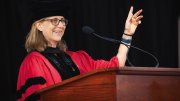Sipping organic turmeric ginger tea and munching crumbly cookies, seven students gathered in the Leverett Senior Common Room to talk, as they do each week. Their group size and discussion topics vary, as do their invited faculty guests. Members of the Harvard Undergraduate Salon for the Sciences and Humanities are hungry for a discussion that goes beneath the surface.
When Emma Fang ’25 came to Harvard, she expected that every group conversation would teach her something new. But she soon realized that rich, unstructured exchanges about academic topics were shockingly rare.
Enter the Salon. In 2021, Julie Heng ’24, Henry Haimo ’24, and Chinmay Deshpande ’24 founded the club to bridge the sciences and the humanities. Three years later, the Salon is a space to discuss big questions, but generally not hot-button political topics. The group facilitates conversations that put professors from many disciplines and students on equal footing, where all participants can speak frankly and disagree.
Throughout 2024, Harvard’s administration has sought to foster respectful discourse. In January, the University hosted a week of “Harvard Dialogues” events. In April, it convened the Open Inquiry and Constructive Dialogue Working Group, which released its findings in September. In October, the school established a fund for student projects that foster intercultural dialogue. But the Salon, unlike these programs, was initiated by students and is run by them, too.
The Salon’s conversation topics span disciplines. In the past three years, students have discussed AI and writing with Johnstone Family professor of psychology Steven Pinker, talked about elementary-school pedagogy and the construction of selfhood with education lecturer Liao Cheng, and hosted a conversation about love and commitment with popular University of Chicago philosopher Agnes Callard that packed Leverett Library Theater far beyond capacity.
The cofounders and their friend group graduated this past spring, leaving the young club at a crossroads. Now, Fang and copresident Micah Pietraho ’25 are charting the future for this group of what Pietraho called “curious and earnest” students. Though the Salon’s founding mission was to find common ground between seemingly distant disciplines, this year, the Salon has stepped back from its science-humanities theme. “Honestly, after three years, the question was getting a little old,” he said. “It sometimes gets you into places where you’re too abstract.”
Instead, the pair is recentering the Salon around its community, which itself bridges the sciences and humanities. Among its consistent attendees are an anthropology concentrator who aspires to work in “science communication” and a statistics concentrator who also studies piano at a conservatory.
Rather than approaching topics as debates, the Salon sees them as opportunities to learn how its intellectually diverse group approaches different subjects. “I don’t see the conversation as ‘We are trying to answer this question,’” said Fang. “I think of it more so as, ‘This is a really interesting question. I want to know what these particular people think about it.’”
“It’s not so easy to have an actually interesting, productive conversation.”
There are two main types of Salon events, which alternate weekly. First, the group meets with a faculty guest, and the copresidents ask about the professor’s research, identifying how those studies connect with students’ lives and launching a group discussion. The following week, the students meet for a dinner centered around a “guiding question” derived from the previous week’s conversation. Recent dinners have explored how students interact with people outside their generation, whether it’s appropriate to explain behavior with biology, and what activities interest students enough to keep their minds from wandering. But a well-crafted premise alone does not guarantee conversational success, Fang acknowledged. “It’s not so easy to have an actually interesting, productive conversation, despite having a group of people who are really committed to that.”
The Salon’s conversational maturity requires norm-setting. The group abides by the Chatham House Rule, which allows members to talk about the conversations with others but not to share who said what. The Salon leadership asks members to tether opinions to personal experience rather than talk completely in the abstract. And the group seeks to keep conversations “very open,” said Pietraho. “When people are referencing Kant, it’s not as inclusive….There isn’t a way for everyone to engage with that.”
In each encounter, Saloners seek disagreement. “It’s very important to not just invite someone who’s going to agree with everybody in the group,” said Salon treasurer Lauren Bartel ’26. “Being challenged through the Salon is a very important aspect for me.”
While the University grapples with how to foster constructive dialogue, the Salon appears to have figured out how to host interesting, intellectually rigorous conversations—as a student initiative, not a formal Harvard venture: an encouraging sign. Now, its members’ challenge is getting more students to the table. During a recent low-attendance meeting, where the faculty guest called in sick, the officers debated how to encourage participation, with one floating a campus-wide poster campaign. Can the Salon get more students to talk?









